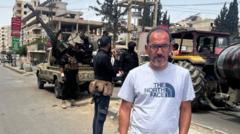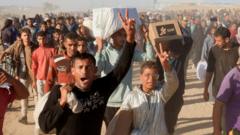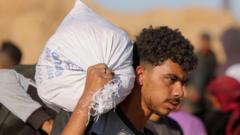On May 9, a team of BBC Arabic journalists, including a British correspondent and local staff, embarked on a mission from Damascus to the southern Syrian province of Deraa, intending to gather footage near the frontier with the Israeli-occupied Golan Heights. This area has been a focal point of tensions since it was seized by Israel, following the announcement by the Israeli Prime Minister regarding indefinite control of a demilitarized buffer zone.
The team, which included two Iraqi BBC staff and four Syrian freelancers, faced a shocking turn of events while filming near a United Nations observation post close to al-Rafeed. An official notified them that the Israeli forces were aware of their presence. Shortly after, while attempting to film near Quneitra city—located in the buffer zone established by a disengagement agreement from 1974—they were confronted by Israeli soldiers.
Upon being surrounded by four soldiers who aimed rifles at them, the team complied with their commands, only for the situation to escalate rapidly. With their phones and equipment confiscated, they were escorted into Quneitra for what would turn into a lengthy, distressing interrogation. As Israeli soldiers examined their footage and questioned their motives for filming, the BBC team experienced a horrifying detention process.
The correspondent described being taken from the car, misled into a separate room where he faced a search and a series of intimidating questions. Meanwhile, his colleagues were subjected to strip searches and sustained interrogation. Under the threat of being monitored and facing dire consequences if any footage was released, the officers went through their personal belongings, deleting photographs and data from electronic devices.
After several hours of intimidation and uncertainty, the team was released and abandoned in a remote area outside Quneitra, where they had to navigate back to Damascus without communication or guidance. The incident underscores the perils faced by journalists in volatile regions like southern Syria, revealing the complexities and dangers involved in reporting from such conflict zones.
The team, which included two Iraqi BBC staff and four Syrian freelancers, faced a shocking turn of events while filming near a United Nations observation post close to al-Rafeed. An official notified them that the Israeli forces were aware of their presence. Shortly after, while attempting to film near Quneitra city—located in the buffer zone established by a disengagement agreement from 1974—they were confronted by Israeli soldiers.
Upon being surrounded by four soldiers who aimed rifles at them, the team complied with their commands, only for the situation to escalate rapidly. With their phones and equipment confiscated, they were escorted into Quneitra for what would turn into a lengthy, distressing interrogation. As Israeli soldiers examined their footage and questioned their motives for filming, the BBC team experienced a horrifying detention process.
The correspondent described being taken from the car, misled into a separate room where he faced a search and a series of intimidating questions. Meanwhile, his colleagues were subjected to strip searches and sustained interrogation. Under the threat of being monitored and facing dire consequences if any footage was released, the officers went through their personal belongings, deleting photographs and data from electronic devices.
After several hours of intimidation and uncertainty, the team was released and abandoned in a remote area outside Quneitra, where they had to navigate back to Damascus without communication or guidance. The incident underscores the perils faced by journalists in volatile regions like southern Syria, revealing the complexities and dangers involved in reporting from such conflict zones.





















